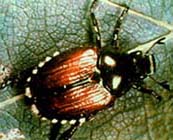Source(s): Stephen D Pettis
Gardening in the southeast is a wonderful hobby. We have long growing seasons, fertile soil, and beautiful summer weather. The daylight lasts until 9:00 pm and there is no end to the kinds of plants we can grow here. There is however a drawback to growing plants in our climate; pests enjoy the same conditions our plants do.
 High humidity and warm temperatures make pest pressure in the southeast the highest in the nation. This makes gardening in our area most difficult some years. Diseases, insects and weeds are all very aggressive in Georgia and, at times, gardening can get to be almost intimidating. Chemicals are scary, weeds grow like crazy and plant diseases seem to follow every rain.
High humidity and warm temperatures make pest pressure in the southeast the highest in the nation. This makes gardening in our area most difficult some years. Diseases, insects and weeds are all very aggressive in Georgia and, at times, gardening can get to be almost intimidating. Chemicals are scary, weeds grow like crazy and plant diseases seem to follow every rain.
There is hope for Georgia gardeners, thankfully. By practicing IPM or Integrated Pest Management in our gardens all year long, we can substantially reduce pest pressure. IPM is the use of all available tactics (biological, cultural, and chemical) to control pests. More simply put, IPM involves using everything at our disposal to control pests, including chemicals as a last resort. The following is a list of things we can do to get the jump on weeds, insects and plant diseases in our landscapes and vegetable gardens this spring:
- Think back to last year. Did you have any pest problems? If so, begin your scouting program in these ‘hot’ spots. Scouting involves examining problem areas for signs of insects, diseases, weeds or the damage caused by them. If you cannot remember from year to year, start a garden notebook to write down your observations for reference in the years to come.
- Begin scouting weekly in February for signs of insect damage. Look closely at the trunks of trees, the buds of flowering plants, the undersides of leaves and around your home for signs of insect damage. Know the enemy! Familiarize yourself with our most common pests. Several publications are available from your local County Extension office that detail what signs to scout for.
- Apply pre-emergent herbicides at the appropriate time to lawns to prevent the weed infestations that are bound to occur. This will reduce herbicide use throughout the summer.
Think about what cultural measures you might employ to keep plants healthy and resistant to pest attacks. Proper fertility, irrigation, mulching, plant site selection and pruning will help assure tougher plants. Again, your local County Extension office is a valuable resource for publications that describe proper cultural techniques.
Use pest resistant varieties of plants in vegetable gardens and flowerbeds. Pest resistance is often listed on the labels of vegetables and some ornamentals.
Be vigilant! Scouting weekly and keeping good records of pest sightings, attacks, cultural methods, and chemical applications can avert large pest outbreaks in the long run.
Use all the tools at your disposal to manage pests. - Gardening in the south can be wonderful if gardeners take the time to employ IPM. Many garden problems can be avoided by a proactive approach to dealing with pests. When infestations do occur, using all control tools available will reduce pesticide use and preserve beneficial insects
Resource(s):
Center Publication Number: 164
- Herbicide Damaged Plants - September 24, 2013
- IPM in the Garden - September 24, 2013
- Leylands Get Really Big - September 24, 2013